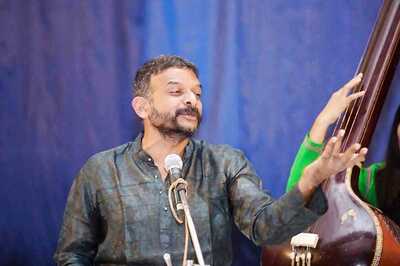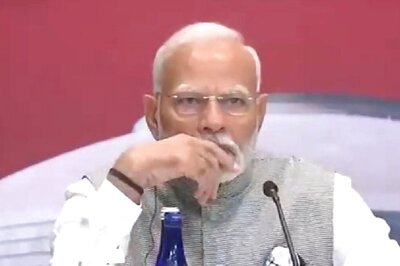
views
New Delhi: The news of Cafe Coffee Day (CCD) promoter VG Siddhartha’s death on Wednesday morning has brought into the limelight the multiple pressures being faced by India Inc.
Rising incidents of “tax terrorism” as some corporate honchos put it, inadequate liquidity in the system due to continuing crisis in non-banking finance companies, increasing corporate debt levels and overall difficulty of doing business in India have become buzzwords for the day.
These pressures were hitherto being spoken of in hushed whispers but not publicly and not by captains of India Inc in any case. Siddhartha’s death seems to have been the proverbial last straw breaking the camel’s back. He was known as India’s coffee king, having established the country’s largest coffee retail chain with thousands of outlets across India and abroad.
Everyone seems to have a CCD story, an instance or a meeting held over coffee at one of Siddhartha’s outlet, to narrate today. He went missing on Monday evening and in a letter doing the rounds, reportedly written by him a few days before, Siddhartha blamed tax terrorism and venture capitalists for putting increasing pressure on him.
In that letter, Siddhartha first blamed private equity partners for forcing him to buy back shares, for which he had to borrow large sums of money. He then went on to blame a senior Income Tax department officer for attaching CCD shares, which hurt his subsequent deal to sell off his 20% share in Mindtree, despite him filing revised income returns.
Siddhartha was a rare combination of a successful entrepreneur who was also a polite, shy person unwilling to come into the limelight. One report described him as being frugal to a fault, a rare trait among the well-heeled in India.
His highlighting of the Income Tax department’s doings has probably touched a nerve, especially at a time when tax is a touchy subject anyway with India Inc. The government has recently imposed fresh taxes on those earning more than Rs 2 crore a year, forcing the super-rich to look for avenues outside India for investments.
Foreign Portfolio Investors (FPIs) are taking out their investments from the Indian equity markets because of new taxation rules and the so-called angel tax has already hurt small businesses and start-ups.
New norms on angel tax, proposed in the Union Budget, have come in too late for some. Perhaps Siddhartha’s damning words have stirred corporate India to speak up.
Remember, captains of India Inc, foremost business chambers and leading businessmen have nearly always shied away from criticising the government of the day. It has been an oft-repeated joke among journalists that on Budget day, big corporate names compete with one another to rate the Budget 11 out of 10, however damning the proposals may be since they do not want to be seen on the wrong side of the taxman.
It was the same this year too, despite the super-rich tax and the FPI issues. Till Siddhartha’s troubles came to the fore.
Kiran Mazumdar Shaw, a successful entrepreneur herself and a friend of Siddhartha, launched the first salvo on Tuesday when she said “from license raj, we have moved to inspector raj” in an interview to CNN-News18.
“India has moved from License Raj to Inspector Raj. There is an effort to clean India Inc but the pendulum cannot swing from one extreme to the other. The government needs to exchange with honest businessmen.”
Vijay Mallya, the fugitive businessman who has been claiming his willingness to settle all dues, pleaded his own case when he said in a tweet that government agencies and banks can “drive anyone to despair. See what they are doing to me despite offer of full repayment. Vicious and unrelenting”
I am indirectly related to VG Siddhartha. Excellent human and brilliant entrepreneur. I am devastated with the contents of his letter. The Govt Agencies and Banks can drive anyone to despair. See what they are doing to me despite offer of full repayment. Vicious and unrelenting.— Vijay Mallya (@TheVijayMallya) 30 July 2019
The Opposition too has pointed towards increasing tax terrorism, with the Karnataka Congress alluding to this term in a tweet over the CCD founder’s demise. Siddhartha’s father-in-law SM Krishna is a former Congressman and ex-chief minister of Karnataka.
The state Congress said Siddhartha’s case was unfortunate and a “result of harassment by I-T officials and a decline of India’s entrepreneurial position turning virulent by the day, with tax terror and collapse of economy. Companies that flourished under the UPA government have been shut down with many people becoming jobless”.
Not just the instance of CCD and its tax woes, corporate India has been reeling under a government which seems almost trigger happy on taxation. Take the case of the new tax on the super-rich, which has impacted FPIs and bears have ruled the Indian equity markets for weeks now.
The bourses lost $2 billion in July alone as foreign investors remained concerned on taxation on the super-rich as well as a slowing economy and chose to park their funds in other economies.
A government trying desperately to raise more taxes as it falls short of money to fund its various welfare schemes, while having unrealistic expectations from tax revenues, has probably little option but to tax everything in sight.
But what is being highlighted by India Inc after Siddhartha’s demise is the undue pressure the authorities may be exerting on the corporate world for extracting these taxes.
Ironically, the term “tax terrorism” was coined by former finance minister Arun Jaitley to describe coercive efforts under the UPA regime to collect taxes. But this term has now returned to haunt the BJP-led NDA government.
While FM Nirmala Sitharaman has indicated she is willing to listen to FPIs’ troubles and has eased some other taxation issues such as those related to start-ups and angel tax, the government clearly needs to do more. Specially now, as the overall economic growth has also slowed down and private investment needs to be encouraged.
Analysts at brokerage Normura have already estimated GDP growth slowing down to 5.7% in the June quarter this year from 5.8% in the immediately preceding March quarter. Other analysts have already said that growth is likely to dip further before bouncing back.
In the current scheme of things, an assurance from the government about dealing with India Inc’s woes with compassion would go a long way in assuaging concerns.


















Comments
0 comment